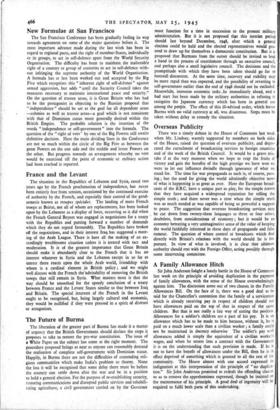Overseas Publicity
There was a timely debate in the House of Commons last week when Mr. Lindsay, warmly supported by members on both sides of the House, raised the question of overseas publicity, and depre- cated the curtailment of broadcasting services to foreign countries and of the work of the British Council. It would be a grave mis- take if at the very moment when we hope to reap the fruits of victory and gain the benefits of the high prestige we have won we were to let our influence dwindle through ignorance of what we stand for. The time for war propaganda as such is, of course, pass- ing ; but the need for giving the world admittedly objective news of what is happening is -as great as ever. Here the European broad- casts of the B.B.C. have a unique part to play, for the simple reason that they have acquired a widespread reputation for telling the simple truth ; and there never was a time when the simple truth was so much needed or was capable of being so powerful a support to peace. The suggestion that overseas broadcasting services may be cut down from twenty-three languages to three or four arises, doubtless, from considerations of economy ; but it would be an economy betraying a very unimaginative sense of the value of keeping the world faithfully informed in these days of propaganda and false rumour. The question of where control of broadcasts which deal directly with Britain's relations with the world should lie is im- portant. In view of what is involved, it is clear that ultimate authority should rest with the Foreign Office, acting possibly through some intervening committee.


























 Previous page
Previous page